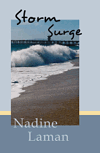Actions speak louder than words, the saying goes. In writing the words have to create the visual experience for the reader. Characters can't run from point A to point B to...Z endlessly.
A writer has to give a voice to the characters. Their voice has to be realistic (no one speaks grammatically correct ALL THE TIME) as well as match the character. Each of my beta readers caught Shasta using a double negative. (Can't not, no nothing...) I wrote it that way because six year old kids, especially those who have lived on the street, aren't going to have perfect grammar.
The dialogue has to have the tone of the character and situation. A couple of years ago, my friend Jen Garsee wrote a great blog entry where she had different characters say the same thing. (If I find the specific link, I'll edit it into this post.)
There are rules to dialogue too. In the UK, for example, the ending punctuation is outside the quote mark. In the US, the ending punctuation is inside the final quote mark. There are rules about when to use single and double quote marks. There are format rules requiring each speaker to begin a new paragraph, indented, even if they speak only one word.
There is the endless argument about the dialogue tag -- he said -- part of the formula. One that always gets someone riled up on a writing forum is whether the tag for a question is 'said' or not. If I use a tag, I use 'asked' when it is a question. Technically, I've been convinced that 'said' could be correct. Even if it is, it reads silly. Anything that doesn't read right, even if it is correct, pulls the reader out of the story. Not good.
I attribute deep emotions to my characters. Written dialogue doesn't show when someone's voice drops to a whisper. So I tag it that way. This isn't correct either, but I used it in Storm Surge: “Be careful, don’t cut yourself,” I warn. Maybe it is just me but when I warn someone, I say it different from asking what time it is.
Excessive tagging is boring reading. If it is clear who is speaking, drop the tags. If more than two people are talking, it is unlikely they are going to take turns, 1-2-3-1-2-3-1-2-3, so the unruly characters need their lines tagged.
The fastest way to get me to throw a book in the recycling bin is to make me stop and count down to see who said what when the conversation is long-ish and sentences could be said by anyone in the room. Sometimes this can be fixed with direct address rather than tagging, for example, "Yes Sister, blah-blah-blah." That clearly indicates the speaker is not the nun, but you're screwed if both speakers are nuns. heh heh heh
There are some of the basics about dialogue. A good writer develops a feel for when dialogue is needed to advance the story, to set the pace, to give information, to develop a character.
Do I always get it right? No. Mark Twain had dialogue mastered. Jen Garsee is great with dialogue writing. You don't have to take my word for it, Jen has two YA (young adult) books published by a big publisher. http://www.jeanninegarsee.com/
Monday, May 11, 2009
Subscribe to:
Post Comments (Atom)

 When Paul Fenton stops for breakfast in a small town, he gets more than he bargained for in the process.
When Paul Fenton stops for breakfast in a small town, he gets more than he bargained for in the process.
 When two-hundred-year-old human remains are discovered on one of Neptune's moons, Earth's history falls into question.
When two-hundred-year-old human remains are discovered on one of Neptune's moons, Earth's history falls into question.
 Emily's husband persuades her to try thalidomide to ease her symptoms as she is unaware of the devastating effects.
Emily's husband persuades her to try thalidomide to ease her symptoms as she is unaware of the devastating effects.
 Who is the women's shelter bomber? Melissa Ryan suspects that her husband knows.
Who is the women's shelter bomber? Melissa Ryan suspects that her husband knows.
 Further developments with the Wilder family.
Further developments with the Wilder family.
 A hidden past shakes the O'Donovan family to its core
A hidden past shakes the O'Donovan family to its core
 A swirl of emotion and choice, set in Cape Town, South Africa
A swirl of emotion and choice, set in Cape Town, South Africa
 Love is a constant, but it comes at a price.
Love is a constant, but it comes at a price.
 When the road ahead is unclear, sometimes you have to rely on trust.
When the road ahead is unclear, sometimes you have to rely on trust.
 The struggle between good and evil is ages old. It gets all the more complicated when the good guys aren't all good and the bad guys have redeeming qualities.
The struggle between good and evil is ages old. It gets all the more complicated when the good guys aren't all good and the bad guys have redeeming qualities.
 Story of a land mothering two races of people – the light-skinned and the dark-skinned.
Story of a land mothering two races of people – the light-skinned and the dark-skinned.
 A gifted Ukrainian ballerina comes into possession of a mysteriously coded address book.
A gifted Ukrainian ballerina comes into possession of a mysteriously coded address book.
 Six passengers' lives change for better or worse after they arrive in Honiton.
Six passengers' lives change for better or worse after they arrive in Honiton.
 Resilience and love in a harsh and unforgiving age
Resilience and love in a harsh and unforgiving age
 Kathryn's Beach
Kathryn's Beach High Tide
High Tide Storm Surge
Storm Surge
Great post, Nadine. Thanks!
ReplyDeletexx Jen
Hey Jen,
ReplyDeleteI'm posting your email comment here: I've used "I warned" all the time, because using "warned" is the same as using "admonished" etc. You can admonish someone, you can warn someone, etc. It's "physical" tags I stay away from, e.g. "I giggled" "I snorted" "I sighed" etc. I'll add those after the line, but not as a tag.
Thanks for commenting? How's your WIP (work in progress) coming?
Nadine
Whoops, correction:
ReplyDeleteThanks for commenting!
Sheesh, they (? + !)aren't even near each other on the keyboard.
Nadine